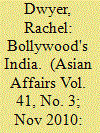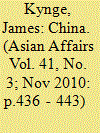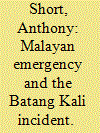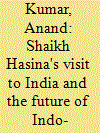| Srl | Item |
| 1 |
ID:
100685


|
|
|
|
|
| Publication |
2010.
|
| Summary/Abstract |
This article propounds the thesis that Bollywood cinema, the modern Indian cinema based in Mumbai (Bombay) is a better guide to the realities of modern India than other, more scholarly works. The author, who distinguishes and describes a number of different types of Bollywood film, suggests that these films are an unparalleled guide to the thoughts, aspirations and attitudes of the hundreds of millions of members of the emergent middle classes. For example, their view of history is purveyed by the cinema, not by books written by academic historians; their attitudes to politics are formed by films, not by the speeches given by politicians.
|
|
|
|
|
|
|
|
|
|
|
|
|
|
|
|
| 2 |
ID:
100690


|
|
|
|
|
| Publication |
2010.
|
| Summary/Abstract |
The author suggests that the Chinese economy is no longer an export-driven economy but instead is driven by internal demand, which results from the rapid rate of growth over the last few years. The nearest comparison is with the development of a continental economy in the United States in the second half of the nineteenth century. But the Chinese economy is growing much more rapidly than the US at that time. Crucially, massive infrastructure development and workers' remittances back to the rural areas have transformed the economy of parts of China previously unmarked by development. As a result whole cities are growing up where not long ago there was nothing.
|
|
|
|
|
|
|
|
|
|
|
|
|
|
|
|
| 3 |
ID:
100677


|
|
|
|
|
| Publication |
2010.
|
| Summary/Abstract |
In a slightly contrarian contribution, the author reminds us that trends do not imply inevitability. Twenty years ago Japan loomed very large, now all the focus is on China and India. But as development proceeds, the going will get tougher. There will be challenges to stability from the perceived "unfairness" of economic growth and real problems in providing adequate infrastructure, especially urban infrastructure. A further major concern is the environment. And finally there is the global context to consider. China's appetite for an ever-increasing share of the world's natural resources has a global impact as does her export effort. Can these and other forces be accommodated within the existing international institutional framework?
|
|
|
|
|
|
|
|
|
|
|
|
|
|
|
|
| 4 |
ID:
100680


|
|
|
|
|
| Publication |
2010.
|
| Summary/Abstract |
The article describes the Batang Kali incident in which a number of Chinese workers were shot dead by the British army in circumstances which have never been satisfactorily explained. The author, who published a history of the Malayan Emergency some years ago, sets the incident in the wider context of British policy in the somewhat confused early months of the Emergency. He then chronicles the subsequent attempts to re-examine events. He then examines various suggestions that British policy was in general one of deliberate counterterror and concludes that the available evidence does not really substantiate this charge.
|
|
|
|
|
|
|
|
|
|
|
|
|
|
|
|
| 5 |
ID:
100682


|
|
|
|
|
| Publication |
2010.
|
| Summary/Abstract |
The author identifies three key factors: the resurgence of the Taliban, the leadership of President Karzai and the regional context. The war in Iraq was a costly distraction and it was a mistake to focus nation-building on elections rather than on the strengthening of proper institutions. Economic development, especially agriculture, has not received sufficient attention, with the result that drug production has increased. But there is an increasing recognition that there needs to be some form of conversation with the Taliban. They are now a more sophisticated military organisation, but still an extremely unsophisticated social and political entity. They do not have the answers to Afghanistan's problems. There are many other groups with a stake in the future of the country so any comprehensive negotiation will be very complicated. But it is a positive element that Afghanistan is a tribal society with an enormous capacity for forgiveness.
|
|
|
|
|
|
|
|
|
|
|
|
|
|
|
|
| 6 |
ID:
100687


|
|
|
|
|
| Publication |
2010.
|
| Summary/Abstract |
This is a memoir of the period when the two authors served as contract officers in the armed forces of the Sultan of Oman, one as a soldier, the other as a pilot. The article describes the country and its inhabitants at that time and paints an intriguing picture of a traditional society on the brink of transformation. It also gives details of the military activities in which the authors were involved.
|
|
|
|
|
|
|
|
|
|
|
|
|
|
|
|
| 7 |
ID:
100689


|
|
|
|
|
| Publication |
2010.
|
| Summary/Abstract |
Shaikh Hasina's crushing victory in the December 2008 Bangladesh elections opened a new chapter in her country's relations with Delhi. India had long wanted improvements in cooperation against terrorism and better access to the states of North East India, Bangladesh needed better cooperation over water resources and the trade imbalance. Shaikh Hasina's swift action against insurgent groups trying to operate against India from Bangladesh territory laid the foundations for her very successful visit to India in early 2010 which in turn set the framework for a better future relationship. But in the light of the hostility of many in Bangladesh to improved relations with India, the author examines the options for Indian policy makers. He concludes that the emphasis should be on achieving progress in areas outside security, where progress would be irreversible, while recognising that a real transformation of the relationship would be possible if Shaikh Hasina was able to win the next elections and secure a further term in office.
|
|
|
|
|
|
|
|
|
|
|
|
|
|
|
|
| 8 |
ID:
100683


|
|
|
|
|
| Publication |
2010.
|
| Summary/Abstract |
This article, written before the recent floods, notes that ever since Independence, problems of identity, national security and ethnicity have contributed to Pakistan's history of instability. As a result the country now faces three crises, firstly a conflict over governance between the military and the civilian politicians; secondly a growing terrorist threat from extremist groups, a threat which the army has been slow to recognise; and thirdly a severe economic crisis which complicates the response to the first two crises. The challenge is to start the process of nation-building and achieve a sustained period of democracy under a civilian government, however imperfect. There are some good signs: a small but increasingly vocal middle class is emerging and the press is becoming more influential. But success will also require policy shifts on security from both the army and India. There is not much sign of movement from either of them.
|
|
|
|
|
|
|
|
|
|
|
|
|
|
|
|